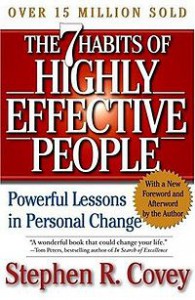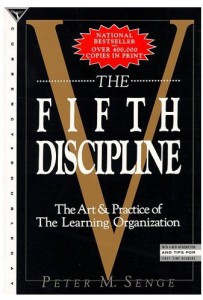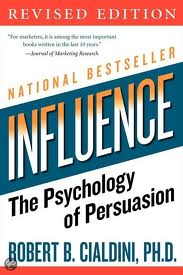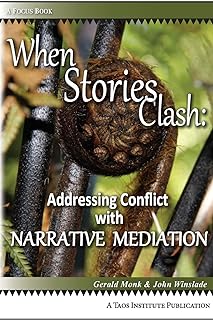Every once in a while it is good to step out of our day2day business, to take a step outside of our “box”. That way we can see ourselves, our situations and our goals from another perspective and gain new insights. We can recharge our batteries and “sharpen our saw”.
Travel for instance offers great opportunities to acquire new views and perspectives. See other sceneries and behavioral patterns, hear other sounds and languages, possibly connect with people who have worldviews fundamentally different from ours. Yet, since we cannot leave our business every week, we will need to find our inspiration closer to our homes.
Therefore on this page you will find some literature on personal and professional development, offering new insights, new perspectives for which you do not even need to leave the house.
Enjoy!
Stephen R. Covey, “The 7 Habits of Highly Effective People”
 The “7 Habits” must be the most well-known and influential management development classic, according to the publisher 15 Million copies were sold. I read it fairly early in my career and I am glad I did: it offered me many fundamental insights I used as a manager and I still use as a trainer.
The “7 Habits” must be the most well-known and influential management development classic, according to the publisher 15 Million copies were sold. I read it fairly early in my career and I am glad I did: it offered me many fundamental insights I used as a manager and I still use as a trainer.
Peter M. Senge, “The Fifth Discipline” 
When in 2006 I started reading this book by Peter Senge, the insights he offered me were so convincing, simple and breathtaking that I carried it around in my backpack for weeks – just to be able to use every free moment to read it. For me the Systems Thinking Peter Senge explains so clearly in this book, the complex interconnectedness of all elements of the organisation were insights I would never forget. To those who need to work with complexity in their organisations and have not read it yet: Read This Book, and Enjoy!!
Robert B. Cialdini, “Influence: the Psychology of Persuasion” 
In this important and highly entertaining book Robert Cialdini offers us the six basic factors which allow us humans to be influenced – or to influence others. Did you know, for instance, that we subconsciously always want to be consistent with ourselves? And what situations we get ourselves into because of that? Or are you aware of your response to authority, to someone you consider an expert, taking the lead? If you want to be at least aware why you bought again something you actually did not need, do read this book.
Gerald Monk and John Winslade, “When Stories Clash: Addressing Conflict with Narrative Mediation”
Gerald Monk and John Winslade have written a series of book and articles on narrative conflict resolution. This one is intended to give practitioners an accessible window into the skills of narrative practice. In the stories that people tell about conflict, the relationship narrative is commonly shaped to fit the conflict story. But there are always other relationship stoties that can be told. This book shows how to find and grow a counter story to the conflict story and to help people make choices about which story they want to perform.
